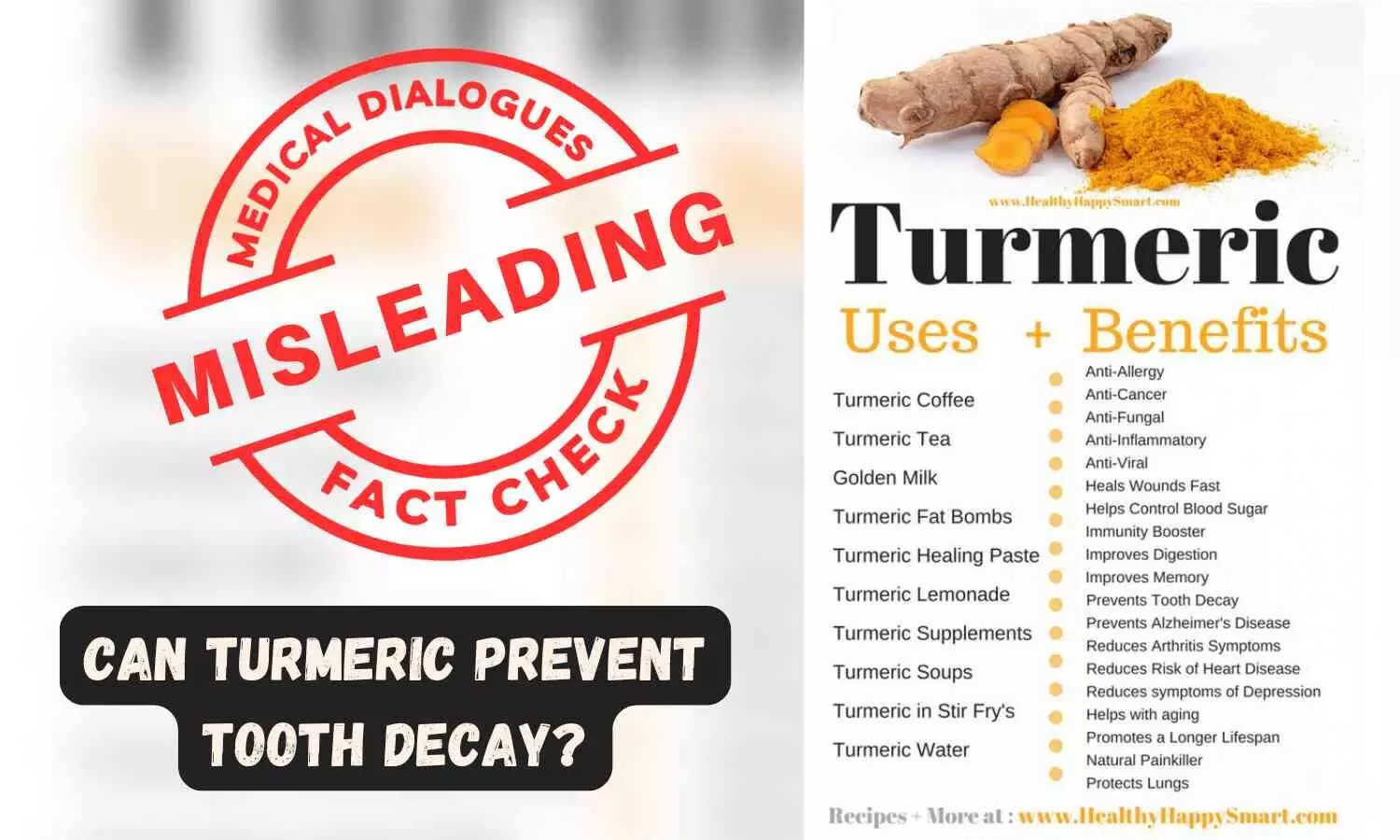Fact Check: Can Turmeric Prevent Tooth Decay?

A Pinterest post claims that turmeric can prevent tooth decay. This claim is Misleading.
Claim
A Pinterest post titled “The Best Turmeric Uses + Benefits. Healthy. Happy.Smart” mentions various types of turmeric products such as turmeric coffee, tea, golden milk, and fat bombs on the left side and on the right mentions its various uses
In the post, the user Healthy. Happy. Smart. states, “The best turmeric uses for better health and wellness" and mentions its uses and benefits like anti-allergy, anticancer, antifungal, anti-inflammatory, anti-viral, heals wounds fast, helps control blood sugar, immunity booster, improved digestion, improves memory, prevents tooth decay, prevents Alzheimer's disease, reduces arthritis symptoms, reduces the risk of heart disease, reduces symptoms of depression, helps with ageing, promotes longer lifespan, natural painkiller, protects lungs.
Along with the other claims, the post makes a claim that turmeric ( and its various products) can prevent tooth decay.
The post can be accessed here.
Fact check
The claim is Misleading. While turmeric may support general oral health through its anti-inflammatory and antimicrobial effects, the specific claim that it prevents tooth decay lacks robust scientific backing. The idea that turmeric could prevent tooth decay is an oversimplification or exaggeration of its general oral health benefits.
Exploring Tooth Decay (Dental Caries)
Tooth decay also known as dental caries, was defined by Shafer in 1993 as an irreversible microbial disease of the calcified tissues of the teeth, characterized by demineralization of the inorganic portion and destruction of the organic substance of the tooth, which often leads to cavitation.
Dental caries is a prevalent chronic infection caused by cariogenic bacteria, particularly Streptococcus mutans, which adhere to the teeth. These bacteria break down sugars to produce acid, leading to the gradual demineralization and weakening of the tooth structure.
Four elements are necessary for the development of dental caries. These elements are bacterial biofilm (plaque), fermentable carbohydrates, dental hard tissue, and time.
Types of Tooth Decay (Dental Caries)
Incipient caries primary caries refers to decay that occurs in an area of the tooth that has not previously been affected by decay. In contrast, recurrent or secondary caries develop at locations with a history of caries, often found around the margins of dental fillings. Arrested caries are lesions that were initially demineralized but later remineralized before causing cavities.
Early childhood caries, commonly affecting the front teeth of the upper jaw but potentially impacting all teeth, are seen in young children and often result from prolonged exposure to sweetened liquids, such as allowing children to sleep with bottles or frequent feeding of sugary drinks. Rampant caries describe widespread and severe decay affecting multiple surfaces of many teeth, typically associated with conditions like xerostomia (dry mouth due to reduced saliva), poor oral hygiene, excessive sugar intake, or stimulant use. If rampant caries result from radiation to the head and neck, they are classified as radiation-induced caries.
Prevention Strategies for Tooth Decay(Dental Caries)
Tooth decay occurs because of the microorganism present in dental plaque and daily removal of dental plaque with tooth brushing and flossing is considered to bethe best preventive method.
Fluoride inhibits dental caries by inhibiting demineralization and enhancing remineralization of tooth structure by the formation of acid-resistant fluorapatite crystals.
Turmeric and its benefits
Turmeric (Curcuma longa), commonly known as haldi, is widely used in Indian households, mainly as a spice. This plant, which belongs to the ginger family, is native to Southeast Asia and is primarily cultivated in that region, especially in India. Historically, turmeric has been utilized in Ayurveda and other traditional Indian medicinal practices, as well as in Eastern Asian systems like traditional Chinese medicine. In India, it was traditionally used for disorders of the skin, upper respiratory tract, joints, and digestive system.
Turmeric is a widely used spice and a key ingredient in curry powder. Its primary active compound is curcumin, with the benefits of turmeric often linked to curcuminoids (curcumin and similar substances). Curcumin is responsible for turmeric's distinctive yellow colour.
In Ayurvedic medicine, turmeric is believed to offer numerous health benefits, such as boosting the body's overall energy, relieving gas, expelling worms, enhancing digestion, regulating menstrual cycles, and easing arthritis symptoms. It is also widely used in South Asian countries as an antiseptic for cuts, burns, and bruises, as well as an antibacterial agent. Modern in vitro studies found that turmeric exhibits antioxidant, anti-inflammatory, antimutagenic, and antimicrobial properties.
Can Turmeric Be Used to Prevent Tooth Decay?
Turmeric offers several health benefits, including its antiseptic and anti-inflammatory properties, promoting digestion, regulating menstrual cycles, and easing arthritis symptoms. Additionally, various studies have shown turmeric’s role in reducing dental caries, plaque index, and gingival index. However, there is no scientific evidence or medical consensus to support the use of turmeric as a sole strategy to prevent tooth decay.
A study published inthe Dentistry Journal highlighted the reduction in the gingival index and plaque index after using turmeric solution, thus concluding that turmeric is effective in inhibiting dental caries and periodontal disease.
Another study led by Vidhya Rekha Umapathy et. al. emphasized the role of turmeric as a dental plaque staining agent to detect dental plaque, and also its use as a subgingival irrigant since it lowers inflammation and as an ingredient to pit and fissure sealant (aid in the prevention or reduction of dental caries)
Yet another study published in the Journal of the National Medical Association found that curcumin helps reduce dental caries by inhibiting bacterial activity.
There is no robust, direct evidence that turmeric, by itself, can prevent tooth decay. There are no significant clinical trials or studies showing that turmeric, on its own or in common forms like turmeric coffee, golden milk, or fat bombs, has a direct effect on preventing the formation of cavities or strengthening tooth enamel.Preventing decay typically involves proper dental hygiene practices, such as brushing with fluoride toothpaste, flossing, and reducing sugar intake.
Responding to the claim Dr Bhumika Gupta Dani, Dental Surgeon, Dani Dental Clinic, Kawardha, C.G said, “Turmeric is known for its anti-inflammatory and antimicrobial properties, which can be beneficial for reducing gum inflammation and supporting overall oral hygiene. While turmeric alone isn’t a magic solution for preventing tooth decay, incorporating it as part of your dental routine may offer some added benefits, especially when used in conjunction with proper brushing, and flossing. I always remind my patients that natural remedies can complement, but not replace traditional dental care practices.”
Dr Prinita Tirkey, MDS Periodontist, Rajmata Smt. Devendra Kumari Singh deo govt medical college and hospital Ambikapur, C.G, added, “Turmeric can be a helpful addition to your oral care routine due to its ability to reduce inflammation and potentially manage bacteria. However, it’s crucial to understand that turmeric cannot replace fundamental dental habits like brushing, flossing, and routine cleanings. Once dental caries have progressed, they can't be reversed, but further progression can be slowed or prevented with proper care.”
Medical Dialogues Final Take
Turmeric is well-known for its various health benefits, such as reducing inflammation and supporting digestion. In terms of oral health, turmeric can play a role in maintaining gum health and promoting a cleaner mouth. While it can be a useful addition to your dental routine, it’s important to remember that it should complement regular brushing, flossing, and professional dental care, rather than replace them. A balanced approach to oral hygiene is still the most effective way to prevent tooth decay. Hence the claim, that turmeric can prevent tooth decay is Misleading.



